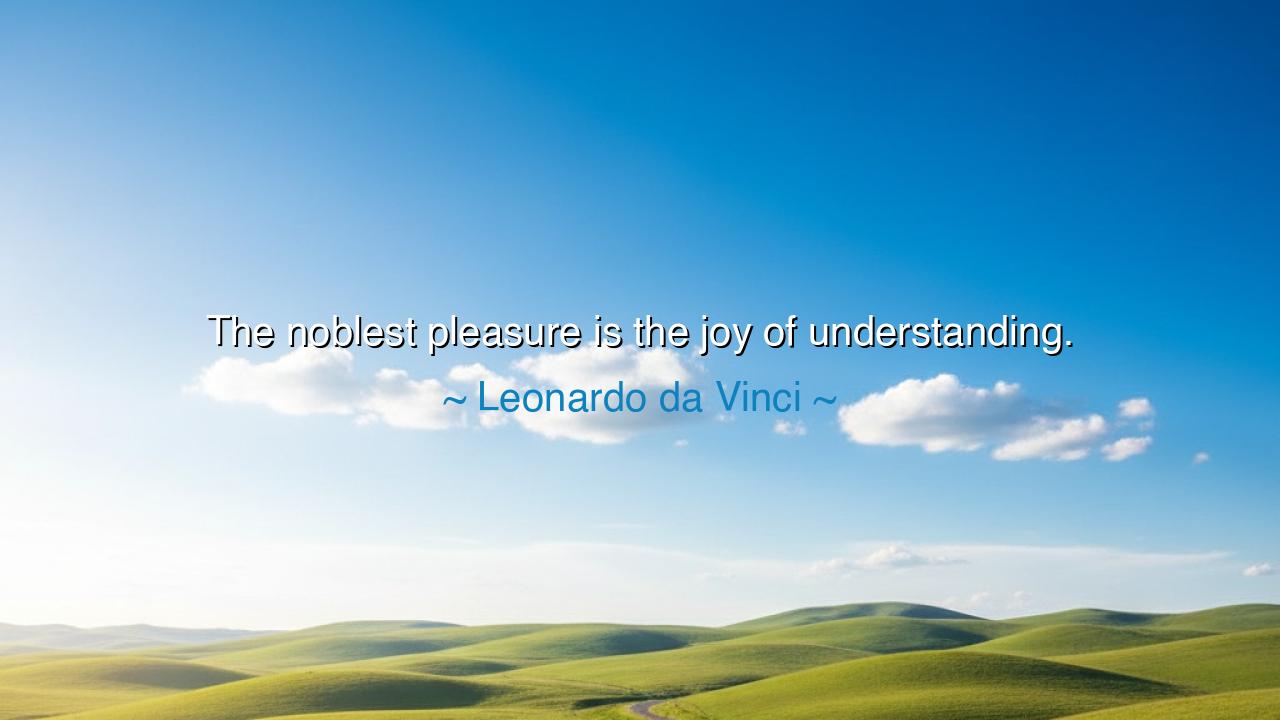
The noblest pleasure is the joy of understanding.






“The noblest pleasure is the joy of understanding.” — Thus declared Leonardo da Vinci, the eternal genius of the Renaissance, whose mind embraced both heaven and earth, whose hands gave life to art and invention alike. These words are not mere ornament to his legend, but the very flame that kindled his soul. To Leonardo, understanding was not simply the gathering of knowledge; it was communion with truth itself. He saw in learning not drudgery, but joy — a sacred pleasure that lifts the human spirit closer to the divine. For to understand is to see through the eyes of creation, to pierce the veil of mystery and behold the harmony that binds all things together.
To call understanding “the noblest pleasure” is to declare it higher than wealth, power, or even sensual delight. For those pleasures fade and enslave the heart, but the joy of discovery — of seeing clearly what was once hidden — endures and expands the soul. Leonardo knew that the pursuit of understanding ennobles humanity; it frees the mind from ignorance and awakens the spirit to beauty and purpose. The philosopher may find this joy in the nature of truth, the scientist in the order of the cosmos, the artist in the revelation of form and light — yet all are united in that sacred moment when knowledge becomes illumination. It is in that instant that one feels the divine spark within — the sense that to understand is to touch eternity.
Leonardo’s life was a testament to this truth. From the time he was a young apprentice in Florence, he hungered to know the reason for all things — the flight of birds, the flow of water, the anatomy of man, the rhythm of music, the geometry of light. His notebooks, overflowing with sketches and reflections, were the record of a soul in wonder. He dissected corpses to learn the mystery of life, studied the movement of stars to grasp the order of the heavens, and through that restless inquiry, he found joy greater than the admiration of kings. For to understand, to connect one truth with another, was for him the highest form of pleasure — not because it granted power, but because it revealed beauty and unity in all creation.
This “joy of understanding” has been the mark of every age of enlightenment. Consider Isaac Newton, who, centuries after Leonardo, uncovered the laws that govern the heavens and the earth. When asked how he achieved such greatness, Newton humbly replied that he was like a child playing by the seashore, finding a smoother pebble or prettier shell, while the great ocean of truth lay before him undiscovered. Therein lies Leonardo’s wisdom: true pleasure does not come from possessing all knowledge, but from seeking and discovering, from the humble joy of glimpsing the vastness of what remains to be known. The one who loves to understand is never idle, never empty, never old in spirit — for they live in the eternal dawn of discovery.
Leonardo’s words also speak against the darkness of ignorance and fear. For ignorance binds the mind with chains, while understanding sets it free. Those who do not seek to learn remain prisoners of illusion, tossed by superstition and prejudice. But those who open their minds to knowledge taste the noblest pleasure, for they become masters of perception — they see truth where others see only shadow. This is not a call to pride, but to reverence; for the more we understand, the more we perceive the depth of the mystery. Knowledge, in its highest form, leads not to arrogance, but to awe.
And yet, in our age of endless information, how few still feel this joy! Too often learning is treated as labor, and understanding as utility — a means to an end, not the end itself. Leonardo calls us back to the sacredness of inquiry. He whispers across the centuries: Study not to boast, but to rejoice; learn not to climb, but to awaken. For when we learn with love, knowledge ceases to be heavy — it becomes music. Every new truth is a note in the divine symphony of creation, and to understand even a single harmony is to taste heaven’s own delight.
So, my child, take this lesson to heart: seek understanding not for advantage, but for joy. When you read, read with wonder. When you observe the world, do not rush to judgment — ask, “Why?” and let curiosity be your guide. Do not fear what you do not yet know; rejoice that there is always more to discover. Let your work, whatever it may be, become an act of study — of seeing, connecting, and creating. For to live in the pursuit of understanding is to live fully awake.
For in the end, as Leonardo da Vinci taught through both word and deed, understanding is the noblest pleasure, because it unites the human soul with the infinite mind of creation. The body may tire, passions may fade, but the joy of comprehension — that moment when confusion yields to clarity, when chaos reveals its hidden order — that joy is eternal. Those who seek understanding walk the same path as the wise and the divine. And when they finally look upon the world with eyes that see and hearts that know, they will find not only knowledge — but bliss.






AAdministratorAdministrator
Welcome, honored guests. Please leave a comment, we will respond soon